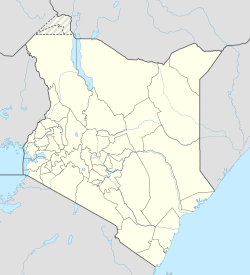Mukuru slums
Mukuru | |
|---|---|
 A street in Mukuru | |
| Coordinates: 1°19′6″S 36°52′21″E / 1.31833°S 36.87250°E | |
| Country | Kenya |
| County | Nairobi City |
| Sub-county | Embakasi and Starehe |
| Time zone | UTC+3 |
Mukuru is a collection of slums in the city of Nairobi. It is approximately 7 kilometres (4.3 mi) south of the central business district of Nairobi. It is one of the largest slums in Nairobi. It stretches along the Nairobi–Ngong River, situated on waste lands in the industrial area of the city between the Outering Ring Road, North Airport Road and Mombasa Road. Mukuru is among other major slums in Nairobi such: Korogocho, Kibera and Mathare.
Mukuru comprises the Mukuru kwa Reuben, Mukuru kwa Njenga, Sinai, Paradise, Jamaica, Kingstone, Mariguini, Fuata Nyayo and Kayaba villages.
Overview

Located approximately 7 kilometres (4.3 mi) south of the Nairobi CBD, Mukuru slums are predominantly a low-income informal settlement. It consists of approximately thirty villages: Kwa Njenga, Kwa Ruben, Sinai, Paradise, Jamaica, Kingstone, Mariguini, Fuata Nyayo and Kayaba. The area sits south of the Viwandani and Industrial Area. The area earliest inhabitants were labourers from the nearby Industrial Area factories who made makeshifts mainly made by corrugated iron shacks. Some of the area that Mukuru slums sits on was initially a quarry that was exploited and was never rehabilitated.[1]
Mukuru slums as any other slum in the world has been faced by challenges including crime, drug abuse, prostitution.[2][3] In the slums, whole families survive in tiny one-roomed corrugated iron shacks. Very few homes have access to electricity and up to twenty families might share a communal water tap and latrine.[4]
The area is considered unsafe due to the air pollution caused by incineration of varied waste, as well as the stench from the unauthorised landfills in the slums.[5][6] Fires are also common and containing them has always been a subject of debate; mainly because the makeshifts are built close to one another and their narrow or no alleys between them.[7][8]
The slums have a high prevalence of respiratory diseases, Malaria, HIV AIDS and waterborne diseases. The slums were earmarked areas more at risk in the spread of the COVID-19.[9][10]
In 2017, among other slum areas in Nairobi, Mukuru was declared a Special Planning Area. Slum upgrading, initiated by the government, is an effort to provide better housing to the slum residents.[11] Known as the Mukuru Affordable Housing, will be actualised on a 55-acre land with 15,000 housing units.[12] Simplified sewer system is set to tackle the decades-long problem of open sewers.[13][14][15][16]
Notable people
Charlot Magayi and her daughter lived here. She is CEO of Mukuru Clean Stoves[17] and a winner of the 2022 Earthshot Prize.[18]
See also
References
- ^ "Mukuru: The Situation". Ruben Centre. Retrieved 30 November 2022.
- ^ "Tales of crime and struggle in Nairobi's bustling slums". Reuters. 25 November 2015. Retrieved 30 November 2022.
- ^ "Police arrest 37 suspects in two-day security operation in Mukuru slums". Nation. 25 October 2022. Retrieved 30 November 2022.
- ^ "The family without a toilet: Our 'hell hole' in Mukuru kwa Njenga slums". Nation. 15 November 2022. Retrieved 30 November 2022.
- ^ Saya, Magdaline. "Nairobi slums record high household air pollution — study". The Star. Retrieved 30 November 2022.
- ^ Bowyer, Cressida; Price, Heather (4 March 2019). "Using art to tackle air pollution: a story from a Nairobi slum". The Conversation. Retrieved 30 November 2022.
- ^ Limo, Judy J. (2012). Factors that influence the increase in fire incidences in informal settlements: a case of Mukuru kwa Njenga slum in Nairobi (Thesis thesis). University of Nairobi, Kenya.
- ^ "Mukuru-Sinai fuel spill and fire disaster" (PDF). Humanitarian Resource.
- ^ "An oasis of hope for people affected by HIV in Mukuru - Kenya | ReliefWeb". reliefweb.int. 8 July 2013. Retrieved 30 November 2022.
- ^ Saunders, Doug (3 December 2020). "Opinion: Huge slums are at the heart of the pandemic – but not for the reasons you might expect". The Globe and Mail. Retrieved 30 November 2022.
- ^ "Community-led upgrade to a Nairobi slum could be a model for Africa". the Guardian. 12 November 2021. Retrieved 30 November 2022.
- ^ December 29 2021, Wednesday (29 December 2021). "State starts building 15,000 houses in Mukuru slums". Business Daily. Retrieved 30 November 2022.
{{cite web}}: CS1 maint: numeric names: authors list (link) - ^ Dodman, David. "A special approach to slum upgrading: the Special Planning Area in Mukuru, Nairobi". International Institute for Environment and Development. Retrieved 30 November 2022.
- ^ "Mukuru SPA". Muungano wa Wanavijiji. Retrieved 30 November 2022.
- ^ "Mukuru Special Planning Area (SPA) Community Mobilisation". Retrieved 30 November 2022.
- ^ Koech, Gilbert. "Simplified sewer system to improve sanitation in Mukuru slums". The Star. Retrieved 30 November 2022.
- ^ "Charlot Magayi". Echoing Green Fellows Directory. Retrieved 4 December 2022.
- ^ Mwangi, Denis (3 December 2022). "Prince William awards Sh150M to 29-year-old Charlot Magayi". Pulselive Kenya. Retrieved 4 December 2022.
- CS1 maint: numeric names: authors list
- Use dmy dates from November 2022
- Use Kenyan English from November 2022
- All Wikipedia articles written in Kenyan English
- Articles with short description
- Short description matches Wikidata
- Coordinates on Wikidata
- Populated places in Kenya
- Shanty towns in Kenya
- Slums in Kenya
- Suburbs of Nairobi
- Squatting in Kenya

